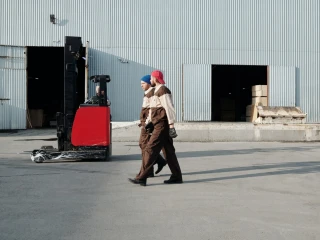Improving accuracy with machine learning
No room for error
It’s one thing for a smartphone to detect a probable fall through an app. In the case of Alpro, however, the stakes were a lot higher. “There’s no room for error,” explains Stijn. “We need to achieve high levels of accuracy for this to work. For example, we don’t want the system to trigger an alarm every time an employee makes an unexpected movement or jumps. There needs to be a clear difference between a ‘real’ fall and what we’d consider ‘unsafe behaviour’, like jumping a few flights of stairs.”
Turning to machine learning
This realization made Alpro and delaware turn to machine learning. “That’s when this became a data project,” says Stijn. To collect the necessary data to get started, Alpro employees started throwing test dummies down the plant’s stairs, smartphone and all. After collecting about 100 data points, the model already achieved an accuracy of 88% in discerning a fall from a no-fall. In a multiclass context – with a ‘safety concern’ category in addition to the ‘fall’ and ‘no-fall’ categories – the accuracy remained at an impressive 84%. This number will surely go up as more data is collected.
